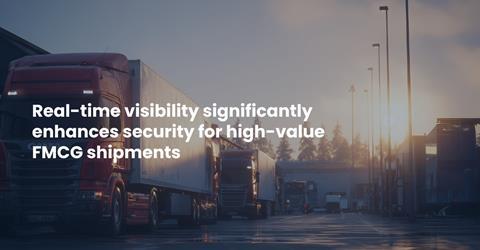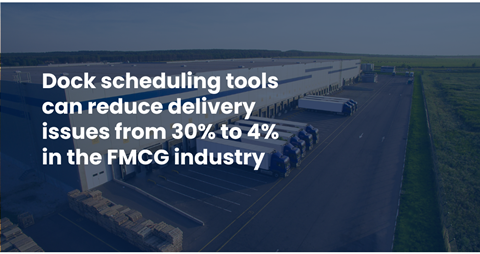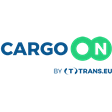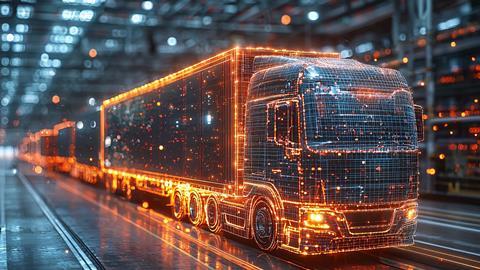How can retailers successfully navigate a volatile logistics space? Ewa Węgorkiewicz, CXO of the enterprise division at Trans.eu Group, talks digitalisation trends and outlines how AI and agentisation can help create the efficient digital transport networks of the future.
The European road transport market is a volatile space right now – with companies facing rising costs, economic pressures and regulatory uncertainty.
In fact, the latest report from the Polish Road Transport Institute (PITD), based on data from Trans.eu, reveals last quarter was particularly turbulent. Emerging signs of recovery were tempered by structural imbalances, putting the market under massive stress.
To succeed in this dynamic space means digitalisation is no longer optional. It’s a must-have for everyone facing rising requirements for product traceability, eFTI regulation (scheduled for full adoption by 2027) and intense regulatory pressure around sustainability and CO₂ reduction.
For logistics directors seeking to future-proof their operations, core success factors remain systematic investments in digital technologies and optimising data-driven processes.
Combating systemic risk – visibility is security
Cargo fraud and theft increasingly plague the logistics industry. Between 2022 and 2024, cargo crimes resulted in a reported total loss of €2.7bn globally – and lack of real-time visibility is putting high-value fmcg shipments at high risk.
In response, real-time load location deters theft and alerts shippers to unusual activity like off-route transport or unscheduled stops. It also fights fraud, such as double-brokering, by verifying carrier identities. Plus, visibility tools can reduce insurance premiums by up to 60% and expand coverage, highlighting the precautions taken to secure goods.

Monitoring visibility: CargoON is a cutting edge solution enabling real-time tracking
- Efficient order management to optimise critical KPIs.
- Monitor shipments in real time with GPS and precise ETAs.
- Leverage exception management without manual updates.
Driving efficiency by standardising processes
Want to be more efficient? The biggest savings can be found by tackling chronically inefficient non-digitised processes, like empty runs and dock scheduling.
Right now, one in five EU trucks travel empty, leading to significant financial losses and environmental concerns. Digital logistics platforms address this by optimising load assignments and capacity utilisation, allowing for immediate responses to available resources.

CargoON Dock scheduler: no more queues outside the warehouse
- Reduce waiting times for loading by up to 70%
- Increase the operational capacity of your warehouse
- Digitalise communication for better collaboration
Dock scheduling systems further enhance efficiency by improving planning. This in turn reduces costs, eliminates demurrage fees and maximises warehouse capacity. For example, one fmcg company saw a dramatic reduction in delivery issues, watching them drop from 30.4% to just 3-4% after implementing these solutions.
CargoON: Solutions for complex logistics
To manage increasing complexity, logistics operations must be built on a foundational digital architecture. CargoON, part of the Trans.eu Group, has identified three critical pillars – the Triple C Architecture for Modern Logistics – that must define next-generation logistics systems:
Connectivity, capacity and communication
1. Connectivity Portal: Designed to bridge every system, partner and process. Seamless integration is crucial given that post-merger integration in the food sector often requires harmonisation of disparate TMS and WMS platforms.
2. Capacity Portal: This helps producers secure the right transport at the right moment. Doing so requires smart allocation and access to extensive, verified networks of transport companies (such as the 40,000+ available in CargoON, integrated on the Trans.eu Marketplace as part of the Trans.eu Group).
3. Communication Portal: Designed to reduce friction and eliminate chaos by connecting all stakeholders in real time with automated workflows and shared data. This streamlines execution across the entire transport digitalisation spectrum – from freight management and tendering through to monitoring and instant incident management.
The future of fmcg logistics – agentisation and the digital network
The logistics industry is now moving toward its next decisive technological frontier: the era of AI and agentisation. The Trans.eu Group is developing game-changing solutions to address this upcoming era and become the largest and most powerful digital network connecting all actors on the supply chain. By leveraging AI and agentisation, the group aims to help its customers improve productivity and shorten time to value within seamless experience.
Discover how CargoON can triple your power at: www.cargoon.eu





















